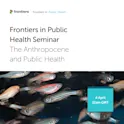
Health
04 May 2023
Ill-fitting gear puts female firefighters at risk: Five Frontiers articles you won’t want to miss
By Deborah Pirchner, Frontiers science writer Image: CAL FIRE_Official/Flickr (CC BY-NC-ND 2.0) At Frontiers, we bring some of the world’s best research to a global audience. But with tens of thousands of articles published each year, it’s impossible to cover all of them. Here are just five amazing papers you may have missed. Ill-fitting gear increases female firefighters’ risk on the job Over the past years, the number of female firefighters has been rising steadily. As of 2020, women make up 9% of firefighters in the US. Despite this, the gear they are wearing is still made for male bodies. Using 3D body scans of 189 female firefighters, US-based researchers have studied this gear to improve comfort, mobility, and safety for female firefighters. They published their results in Frontiers in Materials. The scientists found that female firefighters are wearing personal protective clothing (PPC) with significant fit issues. This reduces comfort, restricts mobility and increases safety risks on the job, they wrote. Between 15% and 21% of female firefighters were found to intentionally leave off a part of their PPC, mostly pants and coats, at least ‘sometimes,’ if not ‘nearly always’. The researchers also identified where the highest potential for design […]













